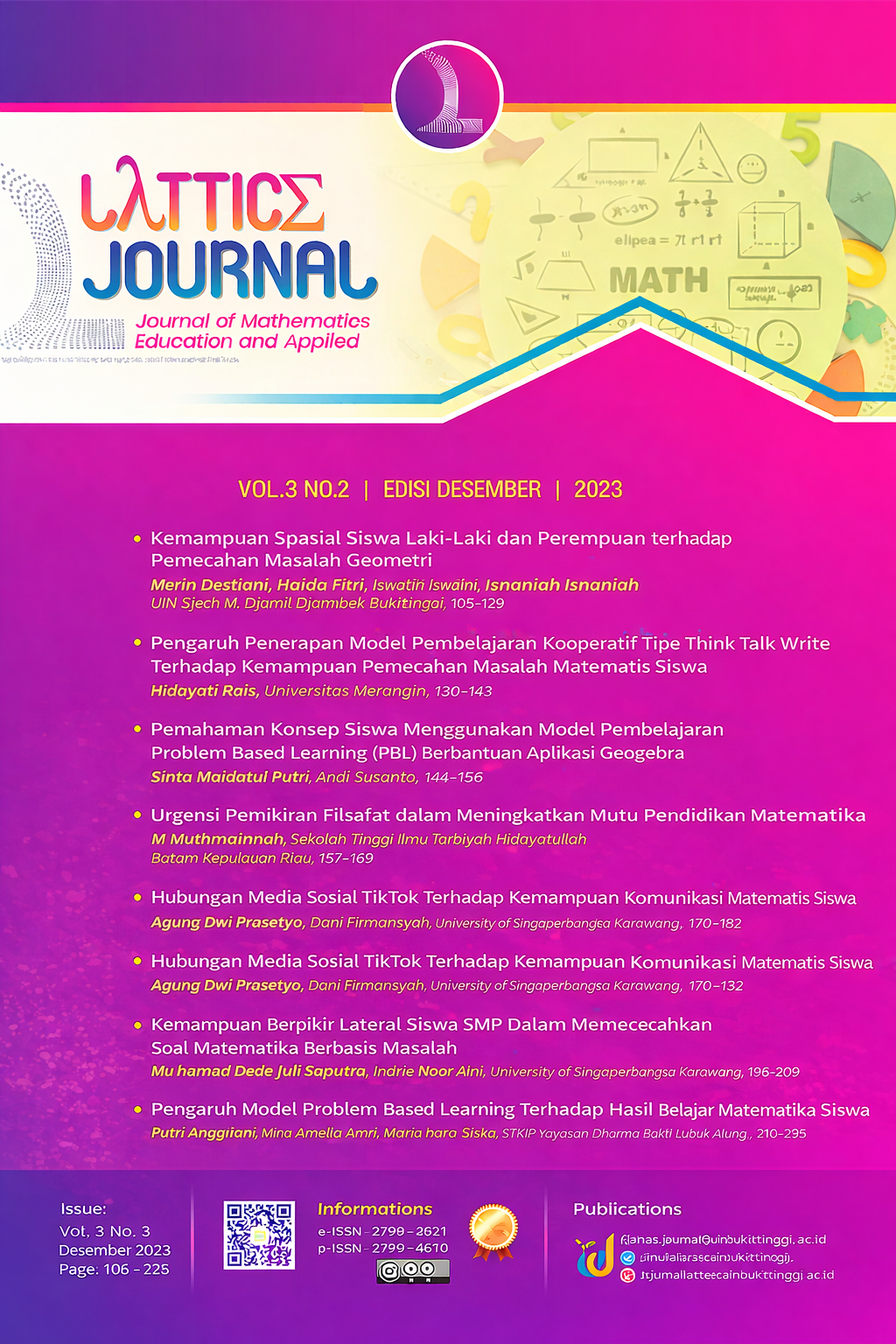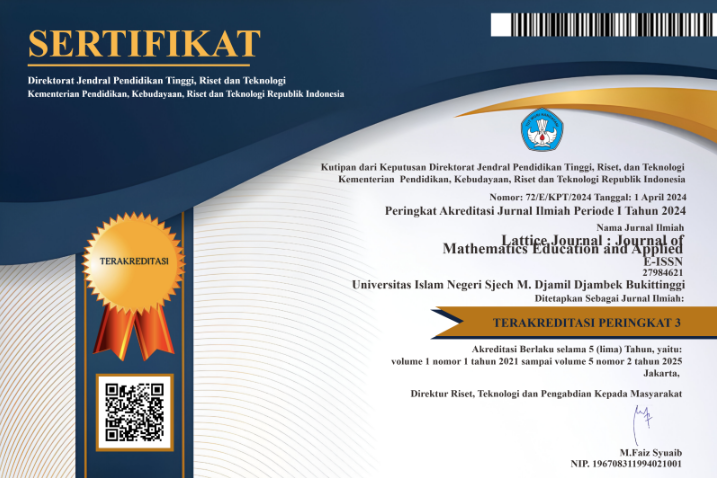Pengaruh Model Problem Based Learning Terhadap Hasil Belajar Matematika Siswa
DOI:
https://doi.org/10.30983/lattice.v3i2.7621Abstract
The_low_mathematics_learning_outcomes_of class X1 Science students_at SMAN 1 Nan Sabaris are the background for conducting this research. The causal factor_is_that_students_are_not_actively involved_in_learning, so_students' problem-solving abilities do not develop well. One_model_that_can_be used_to_improve_students' mathematics learning outcomes is_by implementing a problem-based_learning model. This research aims to determine the effect of the problem based learning model on the mathematics learning outcomes of class XI IPA students at SMAN 1 Nan Sabaris.
This study employs a pre-exsperimental approach utilizing a design that involves only a randomly assigned control group. The study population consisted af all eleventh-grade science students at SMAN a Nan Sabaris for the 2022/2023 academic year. Sampling used a purposive sampling technique, namely class XI IPA1 as the experimental class and class XI IPA2 as the control class. The learning outcomes analyzed are learning outcomes in the cognitive domain with multi-dimensional material.
Based on data analysis, the average value obtained in the experimental class was 77.2857 and the average value in the control class was 66.3636, meaning that the average for the experimental class was higher than the control class. The results of the t-test analysis obtained tstat = 3.6566 and t(0.975; 66) = 1.998. The calculation results show that tstat > ttable means that H0 is rejected, so it can be concluded that there is an influence of learning using the problem-based learning model on the mathematics learning outcomes of Class X1 Science Students at SMAN 1 Nan Sabaris.
Â
ABSTRAK
Rendahnya pencapaian pembelajaran matematika siswa kelas X1 IPA SMAN 1 Nan Sabaris yang melatarbelakangi dilakukannya penelitian ini. Faktor penyebabnya adalah partisipasi siswa rendah dalam proses belajar mengajar sehingga perkembangan keterampilan menyelesaikan masalah mereka tidak optimal. Penerapan model problem based learning merupakan satu dari metode yang bisa digunakan untuk meningkatkan pencapaian pembelajaran matematika siswa. Sasaran dari penelitian ini adalah untuk mengetahui pengaruh model problem based learning terhadap hasil belajar matematika siswa. kelas XI IPA SMAN 1 Nan Sabaris.Â
Penelitian ini merupakan pra-eksperimen dengan rancangan penelitian randomized control group only design. Subjek penelitian ini mencakup semua siswa kelas XI IPA SMAN 1 Nan Sabaris tahun pelajaran 2022/2023. Pengambilan sampel menggunakan teknik purposive sampling yaitu kelas XI IPA1 sebagai kelas eksperimen dan kelas XI IPA2 sebagai kelas kontrol. Hasil belajar yang dianalisis yaitu hasil belajar pada ranah kognitif dengan materi suku banyak.
Berdasarkan analisis data, rata-rata kelas ekperimen melampaui rata-rata kelas kontrol, yaitu 66,3636 pada kelas kontrol dan 77,2857 pada kelas eksperimen. Hasil analisis uji-t diperoleh thitung = 3,6566 dan t(0,975; 66) =1,998. Hasil perhitungan terlihat thitung > ttabel berarti H0 ditolak, sehingga dapat disimpulkan bahwa terdapat pengaruh pembelajaran dengan model problem based learning terhadap hasil belajar matematika Siswa Kelas X1 IPA SMAN 1 Nan Sabaris.
References
D. P. Sari, Isnurani, R. Aditama, U. Rahmat, and N. Sari, “Penerapan Matematika dalam Kehidupan Sehari-Hari di SMAN 6 Tanggerang Selatan,†2020.
D. Widaningsih, Perencanaan Pembelajaran Matematika. Bandung: Rizqi Press, 2010.
T. Wegner, Overcoming The Global Achievement Gap (Online). Cambridge: Harvard University, 2010.
A. Shoimin, 68 Model Pembelajaran Inovatif Dalam Kurikulum 2013. Yogyakarta: Ar-Ruzz Media, 2014.
D. Novita and G. H. Medika, “KEMANDIRIAN BELAJAR MATEMATIKA SISWA MELALUI MODEL PROBLEM BASED LEARNING ( PBL ) DI KELAS VII SMP NEGERI 3 PULAU PUNJUNG,†no. 3, pp. 1861–1869, 2023.
A. Aniswita, Y. Saputra, and G. H. Medika, “Pengaruh Model Pembelajaran Problem Based Learning terhadap Hasil Belajar Matematika Siswa di Kelas VII SMP N 1 V Koto Kampung Dalam Padang Pariaman Tahun Ajaran 2019/2020,†JURING (Journal Res. Math. Learn., vol. 4, no. 1, p. 63, 2021, doi: 10.24014/juring.v4i1.12589.
A. B. et Al, “Seminar Nasional Hasil Riset dan Pengabdian Ke-III (SNHRP-III 2021) Model Problem Based Learning (PBL) Untuk Meningkatkan Cara Berpikir Kritis Siswa di Sekolah Dasar,†2021.
E. Untari, N. Rohmah, and D. W. Lestari, “Mengintregasikan Nature dan Nurture untuk Memberdayakan HOTS di Era Disrupsi,†Pros. Semin. Nas. Pendidik. Sains, 2018.
Sugiyono, Metode Penelitian Kuantitatif. Yogyakarta: Alfabeta, 2017.
H. Ahyar and D. J. Sukmana, Buku Metode Penelitian Kualitatif & Kuantitatif SERI BUKU HASIL PENELITIAN View project Seri Buku Ajar View project. 2020. [Online]. Available: available: https://www.researchgate.net/publication/340021548
S. Arikunto, Dasar-Dasar Evaluasi Pendidikan. Jakarta: Bumi Aksara, 2012.
Sudjana, Metode Statistika. Bandung: Tarsito, 2016.
W. Sanjaya, Strategi Pembelajaran Berorientasi Standar Proses Pendidikan. Jakarta: Kencana, 2016.
N. Wibowo, “Upaya Peningkatan Keaktian Siswa Melalui Pembelajaran Berdasarkan Gaya Belajar di SMK Negeri 1 Saptosari,†2016.
M. W. Kurniawan and W. Wuryandani, “Pengaruh Model Pembelajaran Berbasis Masalah terhadap Motivasi Belajar dan Hasil Belajar PPKn,†2017.
Downloads
Published
How to Cite
Issue
Section
Citation Check
License
Copyright (c) 2023 Putri Anggriani, Mira Amelia Amri, Maria Para Siska

This work is licensed under a Creative Commons Attribution-ShareAlike 4.0 International License.
Authors who publish with Lattice Journal : Journal of Mathematics Education and Applied agree to the following terms: Authors retain copyright and grant the Lattice Journal : Journal of Mathematics Education and Applied right of first publication with the work simultaneously licensed under a Creative Commons Attribution License (CC BY-SA 4.0) that allows others to share (copy and redistribute the material in any medium or format) and adapt (remix, transform, and build upon the material) the work for any purpose, even commercially with an acknowledgement of the work's authorship and initial publication in Lattice Journal : Journal of Mathematics Education and Applied. Authors are able to enter into separate, additional contractual arrangements for the non-exclusive distribution of the journal's published version of the work (e.g., post it to an institutional repository or publish it in a book), with an acknowledgement of its initial publication in Lattice Journal : Journal of Mathematics Education and Applied. Authors are permitted and encouraged to post their work online (e.g., in institutional repositories or on their website) prior to and during the submission process, as it can lead to productive exchanges, as well as earlier and greater citation of published work (See The Effect of Open Access).



